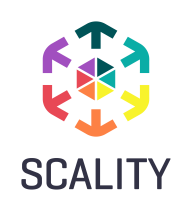


Scality RING and Dell ObjectScale compete in the object storage category. Scality RING appears to have the upper hand due to its advanced disaster recovery options and scalability.
Features: Scality RING offers a strong S3 protocol implementation, impressive scalability for large data volumes, and advanced disaster recovery options. Dell ObjectScale provides strong integration capabilities with other Dell products, comprehensive protocol support including S3, and versatility for enterprise environments.
Room for Improvement: Scality RING could improve in terms of ease of use during capacity upgrades, integration with automation tools, and interface modernization. Dell ObjectScale users suggest enhancements in write performance, ease of scaling out, and additional security features.
Ease of Deployment and Customer Service: Scality RING is primarily on-premises with some private cloud options, while Dell ObjectScale is almost exclusively on-premises. Scality's support is generally good, though users seek more personalized attention. Dell's support receives mixed reviews, with calls for improved technical expertise and localization.
Pricing and ROI: Scality RING offers competitive pricing with cost savings through its pay-as-you-grow model and low cost per gigabyte. Dell ObjectScale is viewed as expensive, yet users find its pricing fair relative to its feature set and integration levels. Scality RING is favored for its efficient cost structure, while Dell is noted for its integration capabilities.
It does not require much management once you set up correctly, so it saves time, allowing an admin to focus on other work.
I have seen both time savings and cost savings, so there is definitely a return on investment with Dell ECS, along with peace of mind.
I think RING's ability to maintain predictable costs while providing scalable storage solutions impacts our budget by allowing us to pay only for capacity.
For instance, while the cost per gig on a block storage platform may be $2, it's $1.50 for NAS, and only $0.50 for object storage, leading to a remarkable 75% reduction in costs by utilizing the Scality platform.
Scality RING has reduced our operating costs.
I would rate them an eight out of ten.
The support is done through email and is not that great, making it a very problematic area I've been dealing with for over four years.
Their technical support has been perfect lately, so I would give it a 10.
There is a lack of SUSE Linux experts which affects the level of support.
The response time and quality of the technical support are satisfactory.
Customer support is generally good but sometimes struggles with complex issues.
I've always received responses within the required timeframe, the answers were technically relevant, and there was follow-up—people called us back to check if everything was okay and if the ticket could be closed.
Individuals such as Peter Mikolastik really make a difference by saying, 'Come on, what is the problem? I will help you,' rather than just brushing things off.
Technically, when we have major issues in P1, they are very responsive and we can't say that we don't get a response.
Pure Storage FlashBlade is scalable.
There are between 5 and 10,000 people using it in our organization.
Through the fabrics, it provides the clustering, allowing us to add nodes easily.
It allows scale-out processes by adding extra nodes, providing flexibility for customers to increase capacity on demand.
I would rate scalability between eight or nine, as it provides a good ability to scale and expand storage.
Upwards, I think, almost unlimited by what we can imagine.
I've never had issues with scalability.
We are relatively well informed about their new features, what will be implemented in future versions, and the scalability of the solution.
In case there is any issue with any blade, the data is moved to another.
We have not experienced any outages in the last four years.
We use it in very critical areas inside Saudi Arabia with critical customers.
I'd rate stability maybe 9.5 out of ten.
It is a platform that is very stable at the customer level and does not generate incidents or blockages that you might encounter with standard storage solutions, where you can lose data.
I find that Scality RING is very stable because it allows for many maintenance operations without service loss.
There are factors that can cause Scality RING to become occasionally unavailable, but due to the system's resilience, it is capable of recovering or degrading gracefully.
Technical support definitely needs significant improvement.
Its configuration should be easier.
One way Pure Storage FlashBlade can be improved is by having more compatibility between the FlashArray and FlashBlade.
Live logs should be viewable through the GUI like with Logstash or Elasticsearch.
The deployment is not easy, and some expertise is required to configure the virtual data center and replication groups.
Incorporating extra integrations beyond S3, like Hadoop file systems, and being well aligned with trends like AI solutions would be beneficial.
Encryption and data security need improvement. We don't have a solution for customers who need confidentiality.
They should prioritize quality over timeliness to minimize customer disruptions and not force customers into a cycle of fixes that interfere with daily work.
What we are currently missing and will be demanding in the new tender is an additional external backup of all data, ideally on a simple system, to safeguard against any severe local incidents so that we still have the data protected elsewhere.
The pricing of Pure Storage FlashBlade is expensive compared to other products I used from other companies in the past, but one benefit is that they have built-in ransomware protection.
Regarding pricing, it is okay; we needed exactly this in size, and the price was a lot lower than competitors, making it good for us.
It relies on nearline SAS drives, which are cheaper than flash or SSDs.
The pricing model is on the higher side compared to other vendors.
The price is reasonable given the abundance of features, including managing, control, host resources, dockers, and containers.
Fortunately, in terms of the license, we are able to expand the disks without having to adjust the license.
In the end, it always depends on how much you pay for it.
Regarding setup costs and licensing, our initial experience is somewhat dated now as we made a comprehensive purchase, including hardware, software, and system setup, which Scality handled at the time.
We can plug in many blades, and we can have data up to one terabyte.
The best features of Pure Storage FlashBlade include better throughput and better performance.
Pure Storage FlashBlade's scalability is one of the most valuable features, and importantly, it always works, allowing for seamless upgrades.
The stability of this solution is a major advantage, as we've not experienced any outages in the last four years.
Dell ECS helps with managing storage requirements since it's S3 kind of object storage with all needed enterprise features such as immutability, snapshotting, and application management, which are nice sets of features usually required.
The impact of Dell ECS on my organization has been positive, improving user experience, security, and reliability.
When a server is lost, the data is still accessible.
It is even better stored when there is only one copy on a system and there is a second copy on an immutability system, which is almost equivalent to backing it up on tape and taking it offline, making it completely inaccessible.
Scality RING has influenced our approach to scaling in different dimensions by providing a cost-effective solution for the tremendous amount of data we generate every day for each customer.
| Product | Market Share (%) |
|---|---|
| Dell ObjectScale | 6.4% |
| Scality RING | 4.1% |
| Pure Storage FlashBlade | 5.2% |
| Other | 84.3% |


| Company Size | Count |
|---|---|
| Small Business | 11 |
| Midsize Enterprise | 11 |
| Large Enterprise | 21 |
| Company Size | Count |
|---|---|
| Small Business | 12 |
| Midsize Enterprise | 12 |
| Large Enterprise | 11 |
| Company Size | Count |
|---|---|
| Small Business | 3 |
| Midsize Enterprise | 1 |
| Large Enterprise | 12 |
FlashBlade is the industry’s most advanced scale-out storage for unstructured data, powered by a modern, massively parallel architecture to consolidate complex data silos (like backup appliances and data lakes) and accelerate tomorrow’s discoveries and insights.
Dell ObjectScale is a next-generation S3 object storage platform known for scalability, performance, and efficiency. It integrates with Dell EMC products, combining hardware and software for seamless user experience in the AI era.
Dell ObjectScale implements the S3 protocol, integrating smoothly with Dell EMC solutions like ISILON. Its architecture supports data compression and interoperates with multiple protocols for enhanced performance. Enterprise features include immutability, geo-replication, and user-friendly management. However, it needs better integration with other systems, enhanced security, and disaster recovery. Write performance and scalability improvements, competitive pricing, and documentation enhancements are key areas for progress. The interface could be more straightforward, with more remote management features and native analytics.
What features does Dell ObjectScale offer?Industries leverage Dell ObjectScale for cloud-based object storage, archiving, and backups. It's favored for unstructured data management, CCTV integration, and document archiving. Strong in data analytics, it integrates well with high-capacity applications, enhancing data retention strategies across fields.
Scality RING is the scalable and resilient object storage solution designed for modern workloads, providing seamless data protection against evolving cyber threats.
Scality RING leverages S3 object storage to meet unpredictable demands with a patented MultiScale Architecture that offers limitless scalability across capacity, performance, and more. It delivers end-to-end cyber resilience with CORE5 for ransomware protection, while its cloud-style economics and intuitive management empower enterprises to accelerate AI initiatives and optimize cloud deployments. Its flexibility is ideal for service providers managing extensive data needs.
What are the key features of Scality RING?Scality RING is extensively implemented in backup solutions across industries, supporting platforms like Veeam and CommVault. It aids in storage expansion and management of large data volumes alongside multi-site architectures. While not leading in AI spaces due to performance constraints, there's potential with faster disk support. It's also used in archives, binary lakes, multimedia services, and AI data lakes.
We monitor all File and Object Storage reviews to prevent fraudulent reviews and keep review quality high. We do not post reviews by company employees or direct competitors. We validate each review for authenticity via cross-reference with LinkedIn, and personal follow-up with the reviewer when necessary.